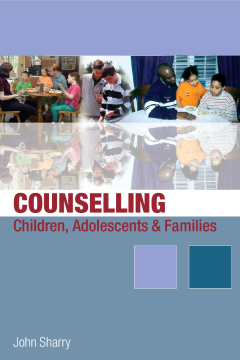
Additional Information
Book Details
Abstract
`I recommend this book to anyone who lives or works with families, children or teenagers' - Nurturing Potential
`This is a valuable book, worth attention in every child and family service. My own agency has ordered a copy!' - Robert Cumming, Nurturing Potential
`John Sharry's book is a jewel in the solution-focused literature. It is clearly and engagingly written, draws on a host of ideas from different therapeutic approaches and is packed with practical examples. There is no better book on strengths-based therapy with children and adolescents. Every team should have one' - Chris Iveson, Brief Therapy Practice
Counselling Children, Adolescents and Families describes an innovative approach to therapeutic work which builds on the strengths of children and their parents. As the author's experience shows, helping clients to focus on potential solutions rather than problems can be a powerful means of engaging them in the therapeutic process, even in the most conflicting family circumstances. Harnessing the client's personal, family and community resources in this way also helps counteract their feelings of powerlessness and the possibility of increasing reliance on professional services.
Part One outlines the basic principles of a solution-focused and strengths-based approach, tackling such thorny issues as how and when to use diagnosis. Part two describes creative applications of the approach, using groupwork, play-based activities and video feedback. Part Three, examines practical issues which arise in more 'difficult' cases, such as child abuse and suicidal teenagers and children.
This book is aimed at professionals and trainees in fields including social work, mental health, childcare, education, psychotherapy and counselling.
"It took me a long time to read this book. It is just that I found the pages so rich in ideas to engage clients and to focus on possible solutions that I deeded to stop and reflect and absorb what I had read. By his practical approach to the work, illustrated throughout the text by an array of real case examples, Sharry has produced a rich resource from which the reader can consider the ideas, reflect upon them and integrate them into his/her own practice. Taking a long time to read it is the only way to do this properly."
Tim Looker
Steinkopff Springer Darmstadt
`This is a valuable book, worth attention in every child and family service. My own agency has ordered a copy!' - Robert Cumming, Nurturing Potential
`This book is highly recommended for counsellors, social workers and students. It is also an excellent resource for therapists who are interested in exploring alternative approaches to intervention. The simple language and expression makes the book a joy to read and the information easy to digest` - Journal of Family Studies
`John Sharry's book is a jewel in the solution focused literature. It is clearly and engagingly written, draws on a host of ideas from different therapeutic approaches and is packed with practical examples. There is no better book on strengths-based therapy with children and adolescents. Every team should have one' - Chris Iveson, Brief Therapy Practice
Table of Contents
| Section Title | Page | Action | Price |
|---|---|---|---|
| FOREWORD by George Foulkes | |||
| PREFACE | |||
| AUTHORS' BIOGRAPHIES | |||
| v | |||
| vii | |||
| . . . | |||
| Vlll | |||
| Introduction 1 | |||
| Enterprise in Africa: new contexts; renewed challenges 1 | |||
| SIMON McGRATH AND KENNETH KING | |||
| PART 1 Micro-enterprises, Macro-perspectives 13 | |||
| 1 Have Africa's economies turned the corner? 13 | |||
| TONY KILLICK | |||
| 2 Developmental states and small enterprises 3 3 | |||
| THANDIKA MKANDA WIRE | |||
| 3 Gender, property rights and trade: constraints to Africa growth 48 | |||
| SUSAN JOEKES | |||
| PART 2 Small and Micro-enterprises and the Development Agenda 61 | |||
| 4 MSEs tackle both poverty and growth (but in differing | |||
| proportions) 61 | |||
| DONALD C. MEAD | |||
| 5 Micro-enterprises in West Africa 7 1 | |||
| JACQUES CHARMES | |||
| 6 Small enterprise development in post-apartheid South Africa 83 | |||
| CHRISTIAN M. ROGERSON | |||
| 7 Inherent gender inequities in small and micro-enterprise | |||
| development in rural Africa 9 5 | |||
| FRA VON MASS0 W | |||
| 8 Enterprise development in Africa: strategies for impact | |||
| and growth 107 | |||
| GEORGE MANU | |||
| PART 3 Collaboration Between Enterprises 121 | |||
| 9 Do SMEs network for growth? 121 | |||
| ABIGAIL BA RR | |||
| i0 Enterprise clusters in Africa: linkages for growth and | |||
| development 132 | |||
| DOROTHY McCORMlCK | |||
| 11 Trading agents and other producer services in African | |||
| industrialization and globalization 1 44 | |||
| POUL OVE PEDERSEN | |||
| 12 MSE associations and enterprise promotion in Africa 156 | |||
| HANS CHRISTIAAN HAAN | |||
| PART 4 Learning to Grow: SMEs, Skills and Technology 169 | |||
| 13 Technology, NGOs and small enterprise: securing livelihoods | |||
| through technical change 169 | |||
| ANDY JEANS | |||
| 14 Competences and other factors affecting the small enterprise | |||
| sector in Ibadan, Nigeria 179 | |||
| SUSANNA ADAM | |||
| 15 Reshaping vocational training: hopeful signs from a Ghanaian | |||
| experience 191 | |||
| LAWRENCE A. HONN Y | |||
| 16 The role and potential of technical and vocational education | |||
| in formal education systems in Africa 202 | |||
| BONA VENTURE WANJALA KERRE | |||
| 17 Learning to grow? The importance of education and training | |||
| for small and micro-enterprise development 21 1 | |||
| SIMON McGRATH AND KENNETH KING | |||
| BIBLIOGRAPHY 223 |
